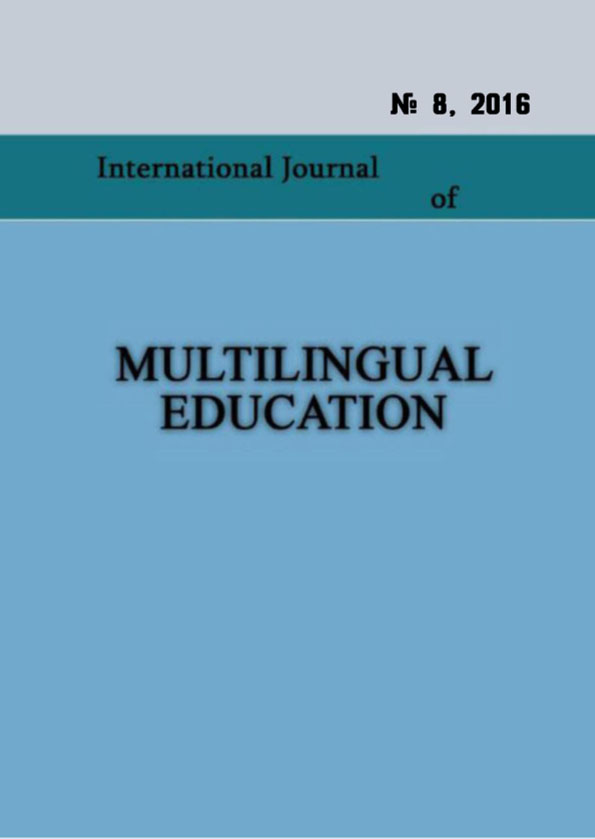Multilingual strategies for integration of ethnic minorities into society
Keywords:
Multilingual Education, Georgia, ethnic and language minoritiesAbstract
Like any other country with a multilingual environment, the representatives of ethnic minorities in Georgia still face problems of integration into society unless they have a good command of the state language. As is known, in order to command a language (whether it is a state, regional, foreign or a minority language), the policy employed must be based on certain principles in accordance with the state policy regarding the issue.
Based on the above, the research subjects of this article are to discuss (1) measures taken by the Georgian state to solve the issues regarding multilingual education and (2) outline challenges and future prospects in this respect.
References
Baker, 2010 –C. Baker,Foundations of Bilingual Education and Bilingualism:Translated by “Center for Civil Integration and Inter-ethnic Relations, 2010.
Grigule , 2010 – L. Grigule, Georgia Minority Education Reform: from local initiatives towards
state planed minority education reform : Journal „Multilingual Education”; #2, გვ 31-43; 2010.
Grigule, 2012 - L. Grugule, A textbook of Multinual education for teachers; Ministry of Education and Sciences, 2012.
National Curriculum- 2011-2016, 2010, Centre for curriculum and assessement, accessed July, 1 2011 http://ncac.ge/index.php?m=854; 2010.
Assessment of Civic Integration of National Minorities in Georgia, UN Accociation of Georgia, Tbilisi, 2010. .
Melikidze, 2010, Melikidze, Research conducted by the Department of National Curriculum of the Ministry of Education, 2010.
Regulations of the Multilingual Education Programmes, Ministry of Education and Sciences of Georgia , 2010.
Mutlilingual Education Strategy and Action Plan, 2009-2014, Ministry of Education and Sciences of Georgia 2009.
National Center for Teacher Professional Development, 2009- Teacher Subject Standards http://www.tpdc.ge/index. php?page=1-7-2&hl=ge
National Center for Teacher Professional Development 2009 - http://www.tpdc.ge/index.php? page=professional-standards&hl=ge; 2009.
Tabatadze, 2011 - Tabatadze.S. (2011). Bilingual Education Policy in Georgia, In Cushner, McClilland & Safford Human diversity in education, integrative approach. (pp. 282-284). New York: McGraw-Hill.
Tabatadze, 2009 - Tabatadze,S. (2009). Education Reform and Non-Georgian schools. Caucasus Institute for Peace, Democracy and Development. Tbilisi. Georgia.
Tabatadze,, 2010a - Tabatadze, S. (2010). New Initiatives of Education Policy in the context of Civic Integration and Non-Georgian Schools, Caucasus Institute for Peace, Democracy and Development. Tbilisi. Georgia
Tabatadze, 2010 b- Tabatadze, S. (2010). Bilingual education programs in Georgia, what public schools can choose. Journal Bilingual Education, 1, 7-21.
Results of the monitoring for fulfilling the action plan and national conception of civil integration and tolerance in 2012 - 2103, Tbilisi 2014
Published
How to Cite
Issue
Section
License
Copyright (c) 2016 Kakha Gabunia, Manana Rusieshvili, Izabella Petriashvili

This work is licensed under a Creative Commons Attribution-NonCommercial 4.0 International License.
Copyright (c) - Authors who publish with this journal agree to the following terms: Authors retain copyright and grant the journal the right of first publication with the work simultaneously licensed under a Creative Commons Attribution-Noncommercial 4.0 International License, which allows others to share the work with an acknowledgement of the work's authorship and initial publication in this journal. Authors are permitted and encouraged to post their work online (e.g., in institutional repositories or on their personal website) prior to and during the submission process, as it can lead to productive exchanges, as well as earlier and greater citation of published work (see The Effect of Open Access). Authors may enter into separate, additional contractual arrangements for the non-exclusive distribution of the journal's published version of the work (e.g., post it to a repository or publish it in a book), with an acknowledgement of its initial publication in this journal.

